How We Select the Best Keywords for Professional Service Firms
So many companies think that to win at SEO, you must rank for as many keywords as possible.
But the truth is that the number of keywords you rank for doesn’t matter that much. What matters is the quality of those keywords and the commercial opportunity they offer.
So, if you wonder why your agency targets only a small number of search phrases or why they don’t focus on seemingly large traffic keywords, this post is for you.
Keep on reading to understand why selecting keywords to target requires more than just looking at their search volume. And, of course, find out what other factors you should consider when deciding what keywords are worth your time and effort.
So, let’s get right to it.
Sam Peters
The Challenge with Selecting the Right Keywords (And Why Some Keywords Don’t Work)
I admit it; this is difficult to accept.
Some keywords, even the ones with high traffic potential, won’t matter to your business that much.
It is true, though.
You see – there is far more to a keyword than its search volume. Sometimes, in spite of large traffic volume, a particular phrase offers almost no business opportunity for your brand.
This can happen for several reasons:
- Different search intent – People searching for the keyword might be doing it to find information that’s irrelevant to your business.
- Competitiveness – Even though the intent matches what your company does, the competition for the keyword is too high to target it yet.
(Note that I said, yet. The keyword might be too competitive for you to target right now. However, the situation will change as your site authority increases.)
- Commercial value – The keyword might attract an audience without the budget to spend on your services. Or the people searching for the phrase might be looking for a cheap solution rather than the premium one you offer.
Let’s review those concepts in more detail.
Search Intent
When we talk about search intent, we refer to a reason for conducting a search in Google or any other search engine.
That reason determines two things:
- What information the user expects to find both in the search results and in the content they click to, and
- The type of content search engines will include in the search listings.
Think about it; when you search for a dentist, a lawyer, or a restaurant, you don’t want to go through countless blog posts about those professions.
You’re seeking recommendations. You want to see reviews and learn about other people’s experiences with those companies. And you want an easy way to contact them too.
But I bet you’d expect to find drastically different information in the search results when researching a new holiday destination, perhaps. In this case, you do want to read blog posts, travel guides, listicles detailing top attractions, etc.
Google is quite aware of your needs too. The company puts enormous effort into ensuring that search listings contain the right type of information, matching your intent.
But the above also means that not all keywords will offer the same opportunity. In some cases, even though the phrase sounds relevant to your business, the search intent behind it might force Google to display different information in the search results.
Here’s one example. At first sight, the phrase – small business CRM – seems ideal for any such software company. And yet, a quick glance at the top-ranking pages reveals that Google does not include a single CRM company in its results!
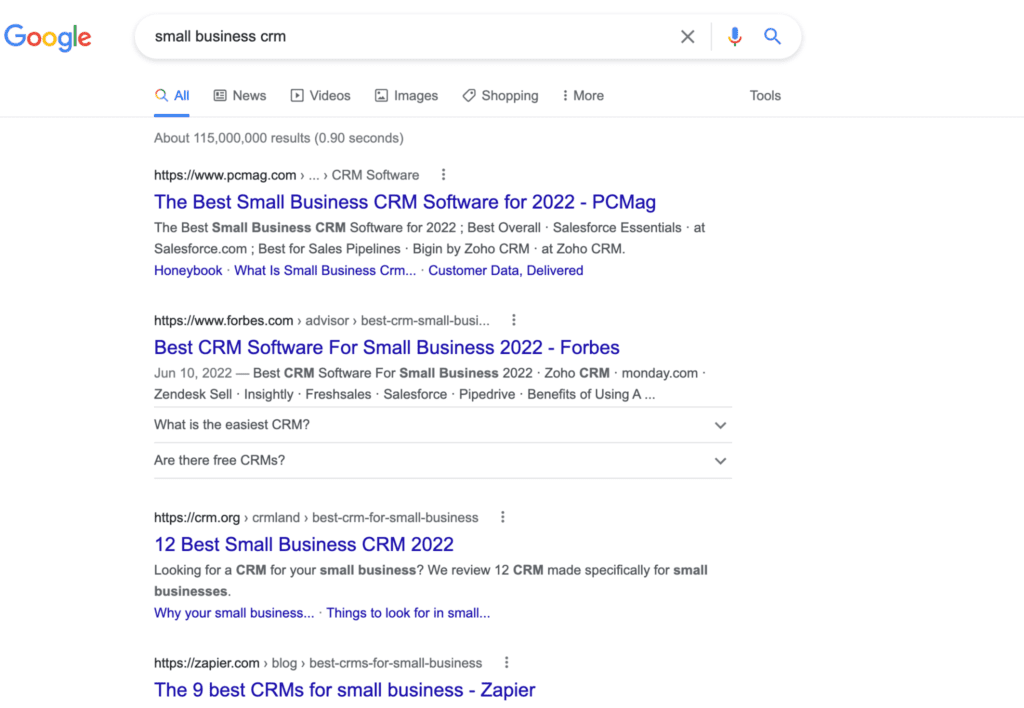
That’s because of the keyword intent. As it turns out, customers searching for this term do not want to review specific software packages. They use the phrase to find suggestions and learn more about available options.
Types of Keywords
Keyword types and search intent go hand in hand. In fact, often, you can uncover the intent just by evaluating the type of keyword.
(That said, as the above example shows, sometimes the keyword type targets a non-obvious intent too.)
Overall, we split keywords into four types:
| Keyword type | Overview | Funnel stage | Example |
| Commercial | Searchers use these keywords when looking to evaluate options to purchase. | Middle | Best earbuds for sleeping, best injury lawyer in Plano. |
| Transactional | Searchers, typically, use these keywords after deciding what product or service to buy, and when they are ready to buy it | Top | Hire injury lawyer |
| Navigational | These keywords help searchers find a specific site or page | Varied | Envoca.com, New York Times online, etc. |
| Informational | Searchers use these keywords to find an answer or when looking for general information or advice | Bottom | What does personal injury lawyer do, how many calories in a ham and cheese sandwich |
Keyword difficulty
This matric– keyword difficulty – describes the effort required to rank on Google’s first page for a particular keyword. Now, various SEO platforms use different formulas to calculate the keyword difficulty, and in most cases, it is a metric to take arbitrarily.
That said, the metric can provide a good insight into how competitive the search results are for your target search phrase.
For example, based on the data below, I can assume that ranking a client for the term “personal injury lawyer” will require quite an effort.
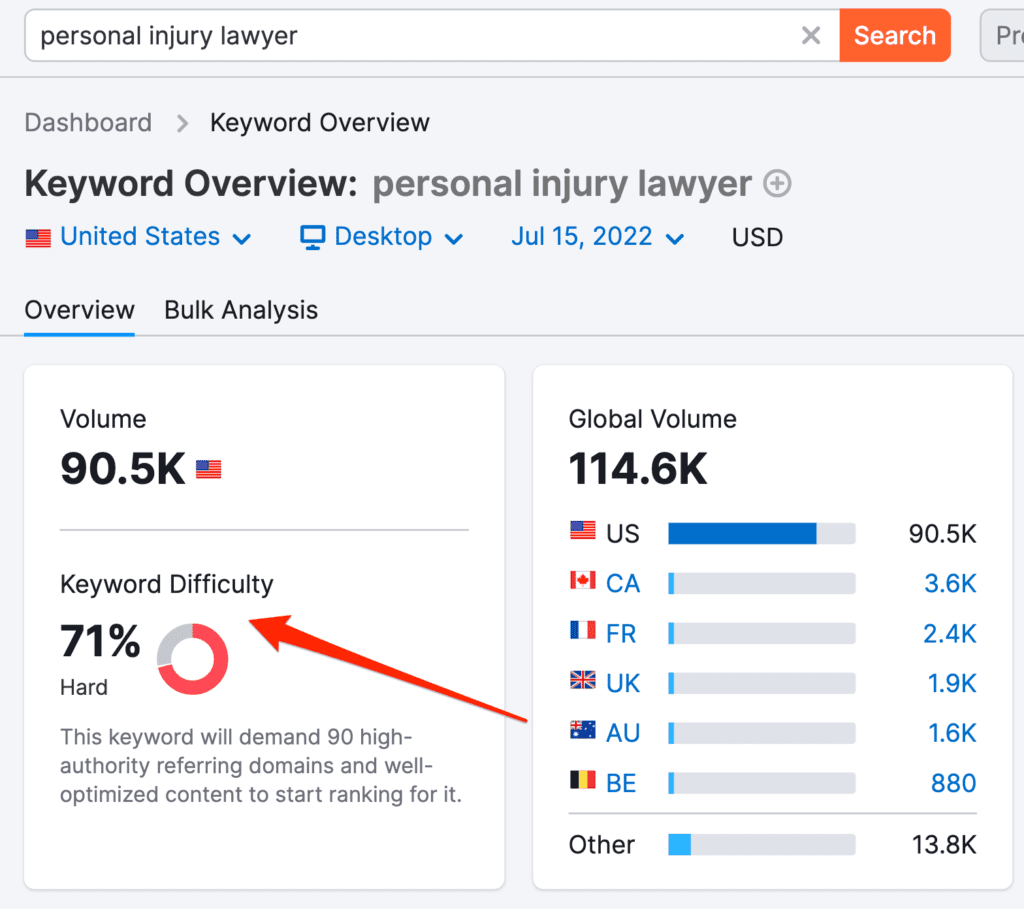
(Keyword difficulty metric in an SEO platform)
Of course, there are other data points I need to evaluate to fully establish that effort – my client’s site authority, their current rankings, link profile, etc. All these factors will affect the actual keyword difficulty for the client.
However, the metric is a great starting point for evaluating whether a keyword is worth the effort or not.
Site Authority
Once again, SEO tools measure authority in their own ways. But they all aim to uncover the same factor – The website’s ability to rank for its target keywords within its niche.
I realize that there’s a lot in that description, so let’s unpack it a little.
Site authority is based on several factors – domain age, its link profile, relevancy of its content to target keywords, the perceived authority of its content, and more. All those factors combine to hint search engines at whether the website can provide valuable information to users.
And naturally, the more authoritative the site seems to search engines, the more likely they are to rank it well (despite it being younger or having fewer links than its competitors.)
Topical Authority
The term – topical authority, on the other hand – refers to the quality and relevance of a site’s content to its market or target topic. In short, it measures whether the site contains content that matches its target topic.
Let me illustrate this with a simple example.
Let’s imagine two law firm websites. One posts new content weekly on topics relating to its core practices – personal injury and family law. The other posts less frequently, and its content focuses on the owner’s interests – cars, sports, etc.
Can you guess which of these two Google will perceive as more authoritative in its space?
The first one, exactly. The site is an ever-growing resource on its target topics, making it a safe bet to provide useful information to relevant searchers.
That’s what topical authority does. It confirms whether your site is the authority and expert in your target field.
What to Consider When Selecting Target Keywords?
So, let’s put what we discussed so far together. Here’s what data we use when building a target keyword lists:
We still start by evaluating search volume.
Naturally, high-volume keywords are the best. But as you’ve seen above, sometimes, they don’t offer the same commercial opportunity as lower volume phrases.
So, we drill down the list of keywords with several other data points:
Keyword difficulty. We look at the difficulty overall but also evaluate it in relation to the client’s site and topical authority. We use these data points to understand where the client’s site is now and how much effort it will require to target specific keywords.
At this stage, we might decide to push some keywords aside, at least until we bring the authority up so that it makes sense to target them.
Keyword relevance and search intent. We also evaluate the top-ranking pages for each keyword and identify the search intent. This helps us to establish whether the phrase matches our client’s objectives.
Keyword value. This is an interesting data point. Keyword value tells us whether the phrase is valuable to the client’s marketing strategy. For example, if a client is looking to dominate the entire search landscape, we will include commercial and informational keywords on the list.
But if the company wants to use SEO to generate leads only, then we might focus on commercial and transactional keywords only.
Industry-specific keywords. We also filter the list looking for phrases focusing on the client’s professional or service. For example, we look for keywords that include phrases like “home appraisal” or “home appraiser,” for example. This helps us uncover additional and often less obvious phrases to target.
Location. We also review keywords referencing the city or area where the client’s business operates and look for opportunities to help them rank for local searches.
We look beyond just the city and try to uncover where the client’s customers come from. In many cases, we discover that we can expand the target radius and cover a broader area. For example, for one client, we identified and targeted phrases in San Francisco and Bay Area. For another, we looked at keywords focusing on Philadelphia and Pennsylvania since their service area covered the entire state.
Keyword variations. Finally, we also search for keyword variations that suggest a higher commercial value. For example, phrases like “best” or “near me” often suggest that the searcher is at the end of the buying funnel.
For example, searchers typing “best injury lawyer” or “divorce lawyer near me” often have already made up their minds about hiring such a professional. They, most likely, have done research into the practice and know exactly what type of lawyer they need. All they want to do now is to find the person they’d like to hire to represent them.
We try to uncover and target those keywords first, as they often deliver the highest return in the shortest time.
Building a Keyword List for a Professional Services Company – A Customer Case Study
Let me show you how all this works in practice.
Not long ago, we got a call from a new client. They were looking to position their law firm for various vaccine-related claims. They specialize in shoulder injuries, SIRVA, etc., and wanted to rank for phrases like “vaccine lawyer,” for instance.
They had good content on the site, and it all revolved around topics related to the target keyword.
The only thing was – their ideas about what to rank for seemed off.
Very off.
Just a quick look at the search landscape revealed many other keywords not only with a significantly higher search volume but also better suited to the law firm’s specialization.
Here’s SEO data for their original target phrase – vaccine lawyer.
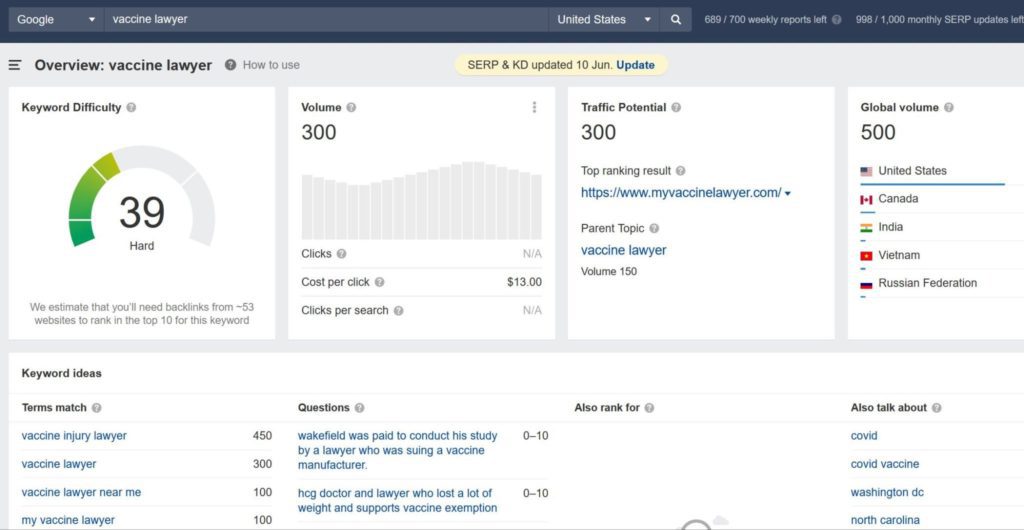
Compare that with the phrase, “vaccine injuries”…
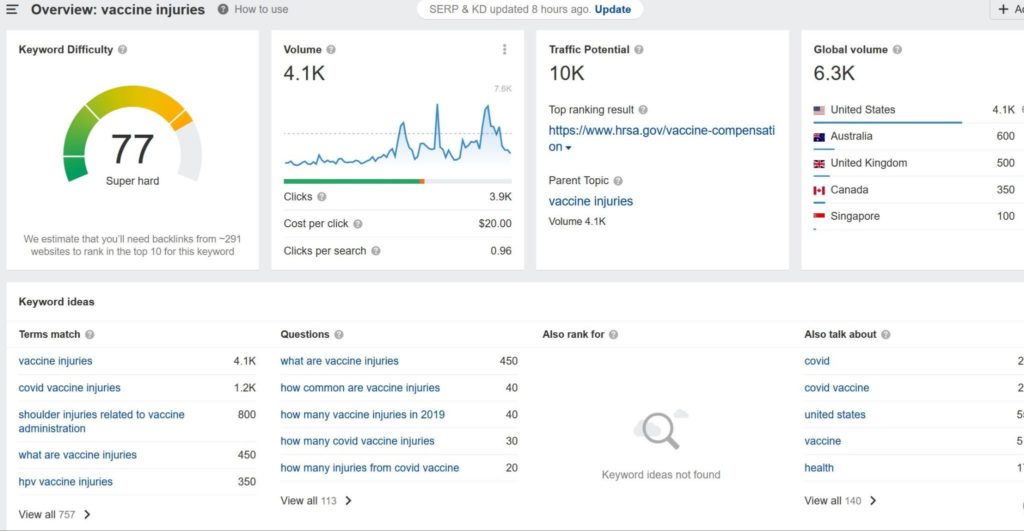
Note the search volume – It is more than 10x higher. However, the keyword is significantly more competitive too (77 versus 39 of the previous keyword.)
But we dug deeper.
In our keyword research, we uncovered phrases like “vaccine lawsuit.” This phrase was only moderately difficult to rank for, but offered a significant search volume too.
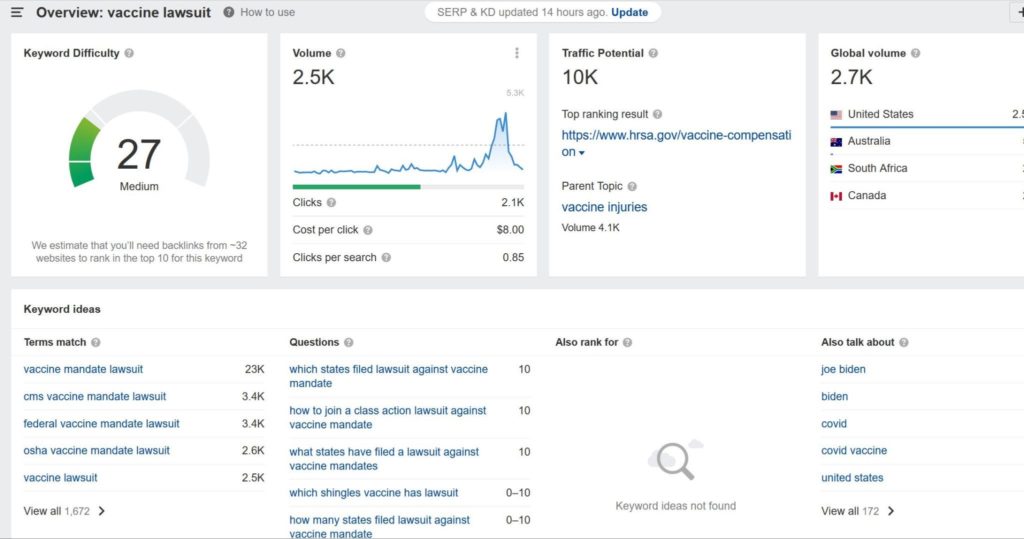
But the phrases we started with offered an even better combination of search volume, relevance, and difficulty.
Here are just some examples.

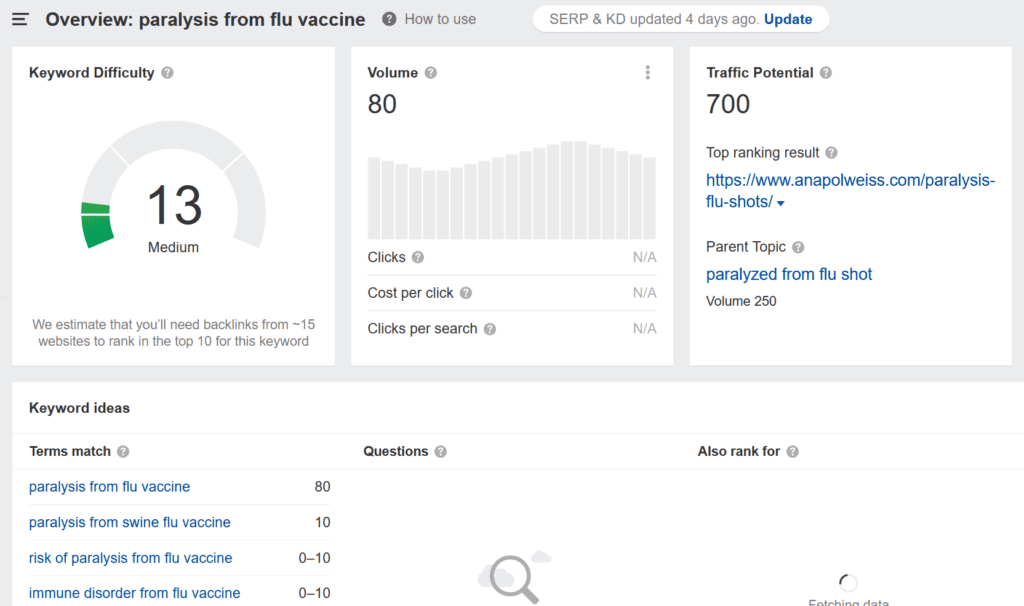
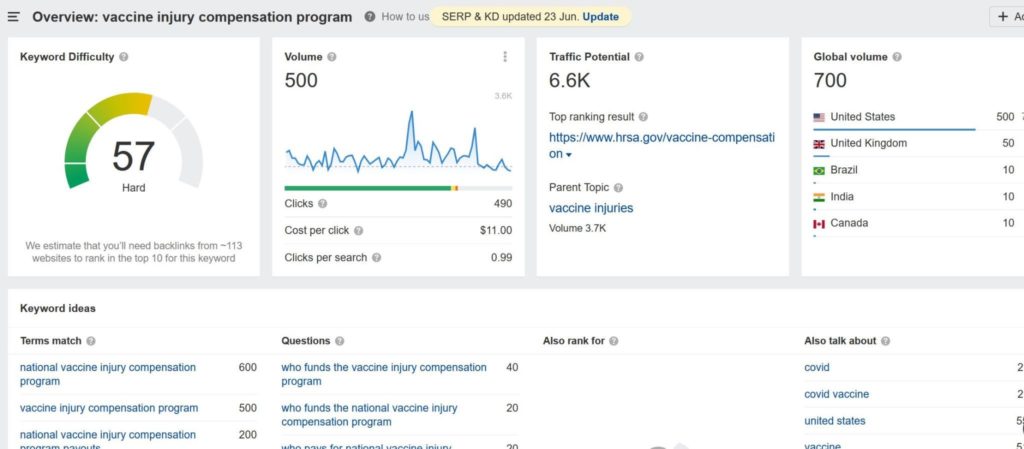
That’s the secret to keyword research. Your “ideal keyword” is often just the start point. You need to look beyond it and uncover related searches that expand on your head term.
These, often, provide a much better opportunity to increase impressions and clicks for the organic search.
Just like it happened to our client.
Conclusion
It’s not what you think – To win at SEO, you don’t need to rank for as many keywords as possible. You just need to position your site for the best keywords that offer the highest commercial opportunity.
In this post, I explained how this works and what factors we consider when building client lists for clients.
Need help with your professional services firm’s SEO? Talk to us. We’ll be happy to discuss how we can help.
Located At
2121 W Spring Creek Pkwy
Plano, TX 75023
Start Your Free Website Audit
© 2025 Envoca - Digital Marketing & Local SEO Agency. All Rights Reserved